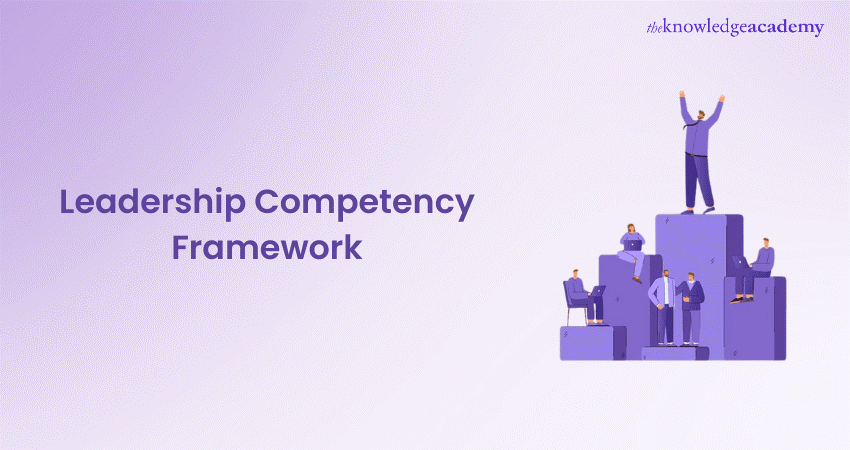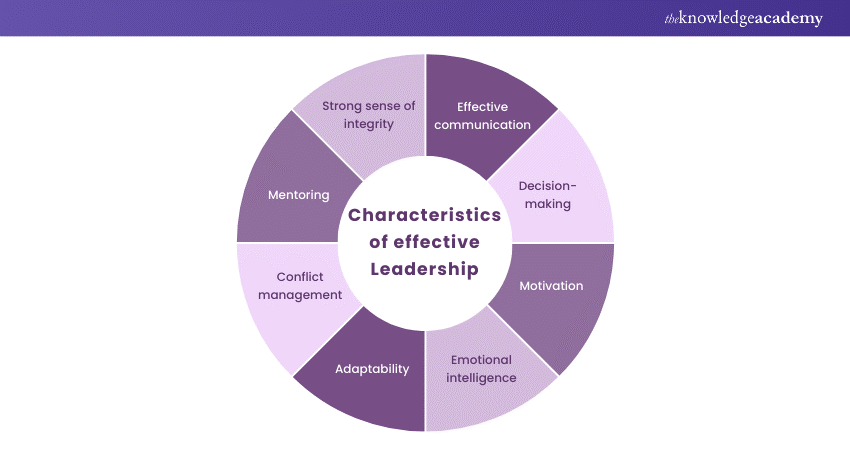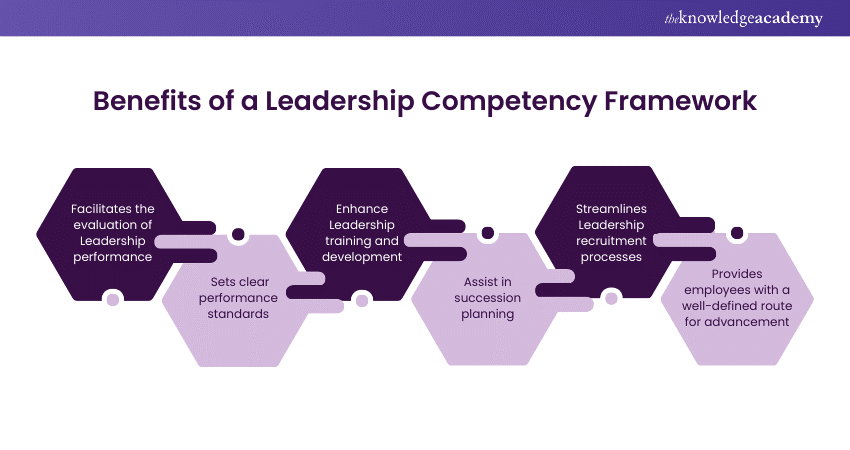We may not have the course you’re looking for. If you enquire or give us a call on +60 1800812339 and speak to our training experts, we may still be able to help with your training requirements.
Training Outcomes Within Your Budget!
We ensure quality, budget-alignment, and timely delivery by our expert instructors.

A Leadership Competency Framework is a structured tool used to identify, define, and assess the skills, and qualities that effective leaders need to succeed. Exploring this Framework can empower individuals and organisations to cultivate strong Leadership.
In this blog, we will delve into the Leadership Competency Framework, exploring its benefits and implementation. Along with essential characteristics for effective leadership. Let’s delve in!
Table of Contents
1) What is a Leadership Competency Framework?
2) Characteristics of effective Leadership
3) Benefits of a Leadership Competency Framework
4) Implementing your Leadership Competency Framework
5) How frequently should you revise your Leadership Competency Framework?
6) Conclusion
What is a Leadership Competency Framework?
A Leadership Competency Framework serves a leader's road map. It provides the fundamental abilities, perspectives, and characteristics of successful leaders. Also, it helps in a clear understanding of your Leadership objectives and how they will contribute to the success of your company. Additionally, it establishes a common Framework for Leadership, managing the actions and requirements of leaders across all roles and levels.
Characteristics of effective Leadership
Effective Leadership isn't just about holding a position of authority, it's about inspiring and guiding others towards a common goal. The following are some traits of successful Leadership:

Effective communication
Effective leaders know the significance of body language and tone of voice. Also, they can convey their thoughts and ideas clearly and concisely, ensuring that everyone on the team understands their vision and objectives. Moreover, they're also great listeners, open to feedback and ideas from their team members.
Decision-making
Effective leaders don't hesitate to make tough decisions. They consider the advantages and disadvantages, obtain relevant information, and then make an authoritative decision. They accept responsibility for their decisions and stick to them, even if they are unpopular.
Motivation
Great leaders inspire and motivates their team members towards a common goal. They set a great example for others to follow by putting their full effort into the work they do. Leaders inspire teams with purpose and confidence through words and actions.
Emotional intelligence
Emotional Intelligence is the ability to recognise, understand and manage one's own emotions, as well as the emotions of others. Leaders with high emotional intelligence are proficient at building strong relationships, resolving conflicts, and navigating interpersonal dynamics effectively. They are supportive, self-aware and skilled at managing stress and pressure.
Adaptability
Adaptability is essential for effective Leadership. Leaders must be flexible and adaptable, able to recognise uncertainty and respond to challenges with determination and agility. They accept change as an opportunity for growth and innovation, instead of being afraid of it.
Conflict management
Conflict management involves resolving disagreements positively to maintain relationships and achieve mutual goals. It requires active listening, kindness, and collaboration to find solutions acceptable to all parties involved. Effective conflict management encourages understanding, strengthens relationships, and promotes a positive work environment.
Mentoring
Mentoring is a positive relationship between experienced and less experienced individuals. The mentor provides guidance, support and insight from their journey to the less experienced individual to help them grow personally and professionally. Mentoring or coaching involves a long-term commitment, promoting a deep sense of trust and connection.
Strong sense of integrity
Integrity is the foundation of credibility and trust in Leadership. Leaders with a strong sense of integrity demonstrate honesty, transparency, and ethical behaviour in all their interactions. They uphold high standards of moral and ethical conduct, even when faced with difficult decisions. Their integrity earns the trust and respect of their team members, encouraging a culture of honesty and accountability within the organisation.
Join our Technical Team Leading Training to enhance your Skills in Team Leadership!
Benefits of a Leadership Competency Framework
A Leadership Competency Framework offers a numerous benefit to individuals and organisations too. Firstly, it provides the clarity by describing the skills and qualities needed for effective Leadership. Additionally, it serves as a roadmap for development, guiding leaders in identifying areas of growth and improvement.
Moreover, a Competency Framework encourages consistency by establishing common standards across the organisation. Ensures that Leadership qualities are consistently evaluated and cultivated. As a result, Leadership practices become more aligned and consistent, which eventually drives organisational success.

1) Facilitates the evaluation of Leadership performance
A Leadership Competency Framework provides a structured approach for assessing Leadership performance objectively. Organisations can carry out independent and consistent evaluations by defining the specific abilities.
This makes it possible to identify leader's areas of strength and need for development. It provides them with focused feedback, which eventually results in more effective Leadership techniques and improved organisational outcomes.
2) Sets clear performance standards
Organisations that have a Framework in place set clear performance requirements for Leadership positions. These criteria act as targets so that the effectiveness of leaders can be evaluated.
The Framework makes sure that expectations in Leadership behaviours are consistent and accountable by lining them up with organisational goals. Because of this clarity, leaders are more capable to understand their roles and responsibilities, which promotes an excellence-driven culture and improves overall performance.
3) Enhances Leadership training and development
A Competency Framework serves as a roadmap for Leadership development initiatives. It identifies the specific skills, knowledge, and behaviours that leaders need to succeed in their roles.
This information guides tailored training, coaching, and mentoring to address identified gaps in Leadership skills effectively. Organisations can maximise leadership training by concentrating on the appropriate competencies, which helps their leaders develop more quickly and perform better.
4) Assists in succession planning
Succession planning is crucial in ensuring the continuity of Leadership talent within an organisation. A Competency Framework provides valuable insights into the skills and knowledge required for future Leadership roles.
Organisations can proactively develop and prepare their next generation of leaders by evaluating their ability to take on new responsibilities. By strengthening the organisation's Leadership process and minimising problems, this strategic approach to succession planning ensures the organisation's long-term success and sustainability.
5) Streamlines Leadership recruitment processes
During the hiring process, candidates can be evaluated on a consistent basis using a Competency Framework. Organisations can create job descriptions and evaluate candidates more skilfully by defining the abilities and qualities needed for Leadership roles. This shortens the hiring process, reduces partiality, and raises the possibility of selecting applicants who fit the position of the company.
6) Provides employees with a well-defined route for advancement
A Competency Framework outlines the competencies required for progression within the organisation. This provides employees with a clear understanding of the skills and behaviours they need to develop to advance in their careers.
Employees can set goals, monitor their progress, and take charge of their professional development journey by following to the developed advancement path. This increases job satisfaction and retention.
Improve your Ethical Leadership Skills with our Ethical Leadership Training!
Implementing your Leadership Competency Framework
Implementing a Leadership Competency Framework is a strategic move that can transform an organisation. By clearly defining the skills and qualities required for effective Leadership the Framework provides a roadmap for personal and professional development. It enables leaders to understand expectation, identify areas of growth, and align their actions with organisational goals.
Moreover, a Competency Framework encourages consistency in Leadership practices, promoting a unified approach across the organisation. This is not only enhancing Leadership effectiveness but also contributes to organisational success.
How frequently should you revise your Leadership Competency Framework?
Maintaining a Leadership Competency Framework in line with changing industry trends and organisational goals requires regular review and revision. A comprehensive assessment should be conducted at least once a year. However, if the company or its surroundings undergo major changes, you may want to consider conducting assessments more frequently.
Regular review and revision of a Leadership Competency Framework is essential for ensuring its applicability and alignment with current goals. This helps in the creation of successful leaders who can propel achievement in changing environments. The Framework's revisions must be flexible and responsive to encourage continuous improvement and adaptability in Leadership development.
Conclusion
In conclusion, a well-defined Leadership Competency Framework is precious for organisations to cultivate effective Leadership. By providing clarity, setting standards, guiding development, and facilitating recruitment and succession planning, it empowers both current and aspiring leaders.
Unleash your potential as a Leader with our Leadership Courses - sign up today!
Frequently Asked Questions

A Leadership Competency Framework is essential for several reasons. It provides clarity by describing the specific skills, behaviours, and qualities required for effective Leadership within an organisation. Additionally, it assists in recruitment, succession planning, and performance evaluation, finally encouraging a culture of excellence and driving organisational success.

Developing a Leadership Competency model involves identifying key skills and qualities crucial for success in Leadership roles within your organisation. This process typically includes conducting research, gathering input from stakeholders, defining competencies, and validating the model through feedback and assessment.

The Knowledge Academy takes global learning to new heights, offering over 30,000 online courses across 490+ locations in 220 countries. This expansive reach ensures accessibility and convenience for learners worldwide.
Alongside our diverse Online Course Catalogue, encompassing 17 major categories, we go the extra mile by providing a plethora of free educational Online Resources like News updates, Blogs, videos, webinars, and interview questions. Tailoring learning experiences further, professionals can maximise value with customisable Course Bundles of TKA.

The Knowledge Academy’s Knowledge Pass, a prepaid voucher, adds another layer of flexibility, allowing course bookings over a 12-month period. Join us on a journey where education knows no bounds.

The Knowledge Academy offers various Leadership Courses, including Leadership Skills Training, Agile Leadership Training and Creative Leader Training. These courses cater to different skill levels, providing comprehensive insights into Leadership Qualities.
Our Business Skills Blogs covers a range of topics related to Leadership, offering valuable resources, best practices, and industry insights. Whether you are a beginner or looking to advance your Leadership Skills, The Knowledge Academy's diverse courses and informative blogs have you covered.
Upcoming Business Skills Resources Batches & Dates
Date
 Leadership Skills Training
Leadership Skills Training
Fri 17th Jan 2025
Fri 7th Mar 2025
Fri 23rd May 2025
Fri 18th Jul 2025
Fri 12th Sep 2025
Fri 14th Nov 2025
Fri 12th Dec 2025







 Top Rated Course
Top Rated Course



 If you wish to make any changes to your course, please
If you wish to make any changes to your course, please


